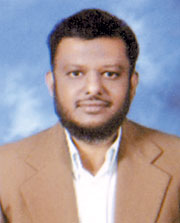JEDDAH, 9 June 2003 — The leader of a prominent Muslim advocacy group in the south Indian state of Tamil Nadu has urged the UN Human Rights Commission to appoint a special rapporteur on India to protect minorities’ rights in the country.
Professor M.H. Jawahirullah, president of Tamil Nadu Muslim Munnetra Kazhagam (TMMK), told a press conference here that he made the demand while addressing the commission’s working group on minorities in Geneva last month.
He also asked the commission’s special rapporteur on the freedom of religion and belief to visit India. He urged the commission’s treaty bodies to demand clarification from New Delhi government on rights violations. Jawahirullah, who was here to perform Umrah, called upon Muslim organizations in India to use the country’s democratic and strategic forums and agencies to protect their legitimate rights and interests.
“We have to establish rapport with rights groups. We should also work for the rights of other minorities like Christians and Dalits to strengthen our force and credibility,” he said. Jawahirullah commended the role played by non-Muslim rights groups and the media in highlighting the massacre of Muslims in Gujarat. “They did a great job and we Muslims are indebted to them,” he added.
A paper presented at the Geneva meeting pointed out that the Muslim minority in India is seriously underrepresented in public employment and security forces, he said. In the Indian Administrative Service only 2.98 percent officers are Muslim while in police service only 3.14 officers are Muslim. The National Human Rights Commission of India has had only one Muslim member during about one decade of existence though its total staff is more than 250.
Jawahirullah urged the Indian government to enact laws to provide reservation for Muslims in all jobs in public and private sectors. He said the government had a duty to do so under the Indian constitution and UN Declaration of Minority Rights.
He also urged the government to adopt a proactive policy to develop the educational status of the Muslim community. “It should adopt a liberal policy of granting aid to the existing as well as new institutions of minorities,” he said.
Jawahirullah said Muslim representation in Parliament and state assemblies was declining. There were 46 Muslims (nearly 10 percent) in the Lok Sabha in 1982, a figure which went down to 26 (only five percent) in 1991 elections. “This was mainly because of lack of unity and proper planning,” he said.
The TMMK leader urged the government to enact legislation reserving exclusive seats for Muslims in Parliament, state assemblies and local bodies in proportion to their population. He also called upon the Indian government to carry out special projects for the socioeconomic development of the Muslim community.
He proposed the creation of a Muslim minority development board to oversee the implementation of welfare projects. The board could provide interest-free loans to Muslim entrepreneurs and waive taxes for at least five years for new industries set up by Muslims.
While addressing the UN meeting, Zawahirullah mentioned the threat of Vishwa Hindu Parishad to demolish 35,000 mosques in various parts of India. He also defended the rights of scheduled castes and tribes to reservation. Referring to Gujarat, he said the situation of Muslims in the state was still pathetic.


